|
#1
| |||
| |||
|
I want to give the exam of University Grants Commission NET and for that I need to get the syllabus of Library and Information Science so can you provide me that?
|
|
#2
| |||
| |||
|
As you want to get the syllabus of Library and Information Science of exam of University Grants Commission NET so here is the information of the same for you: Some content of the file has been given here: 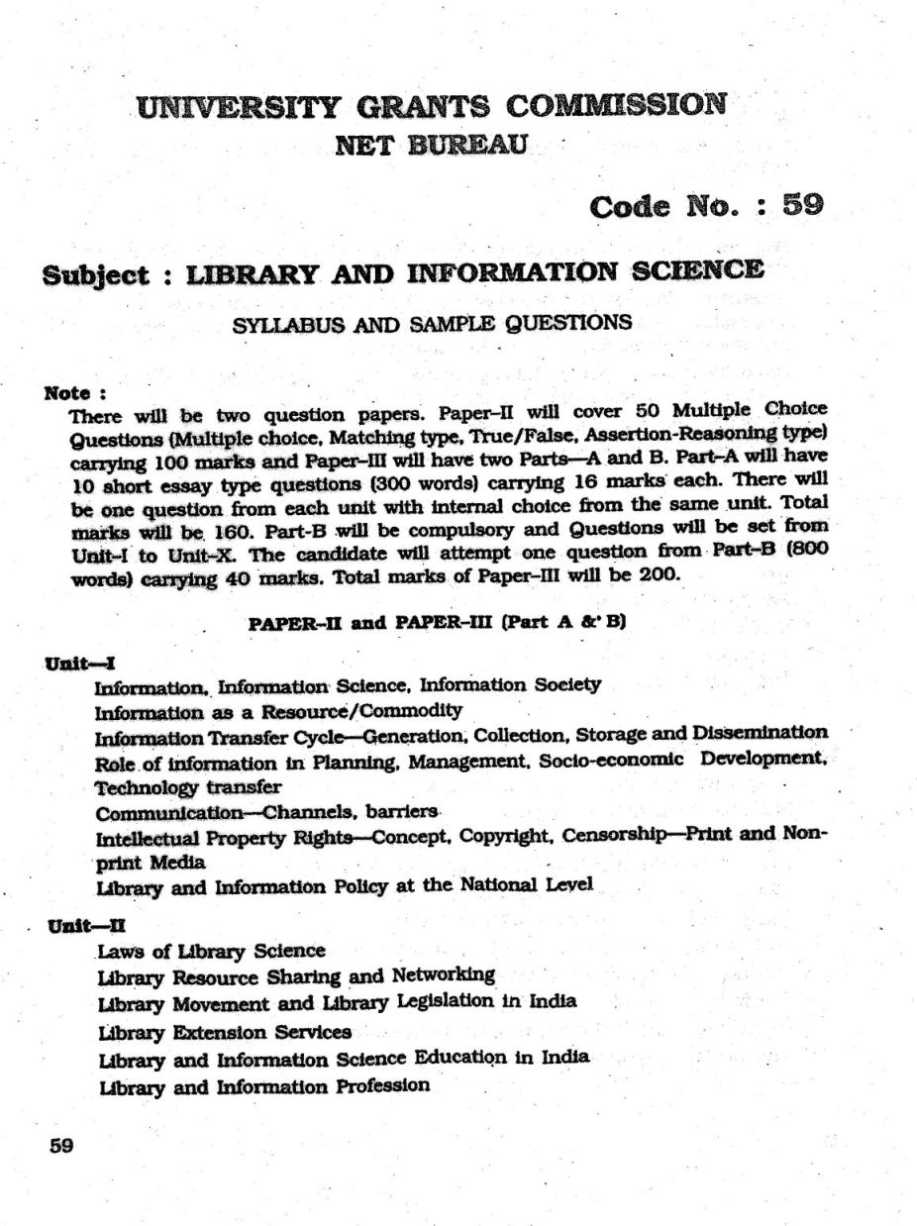 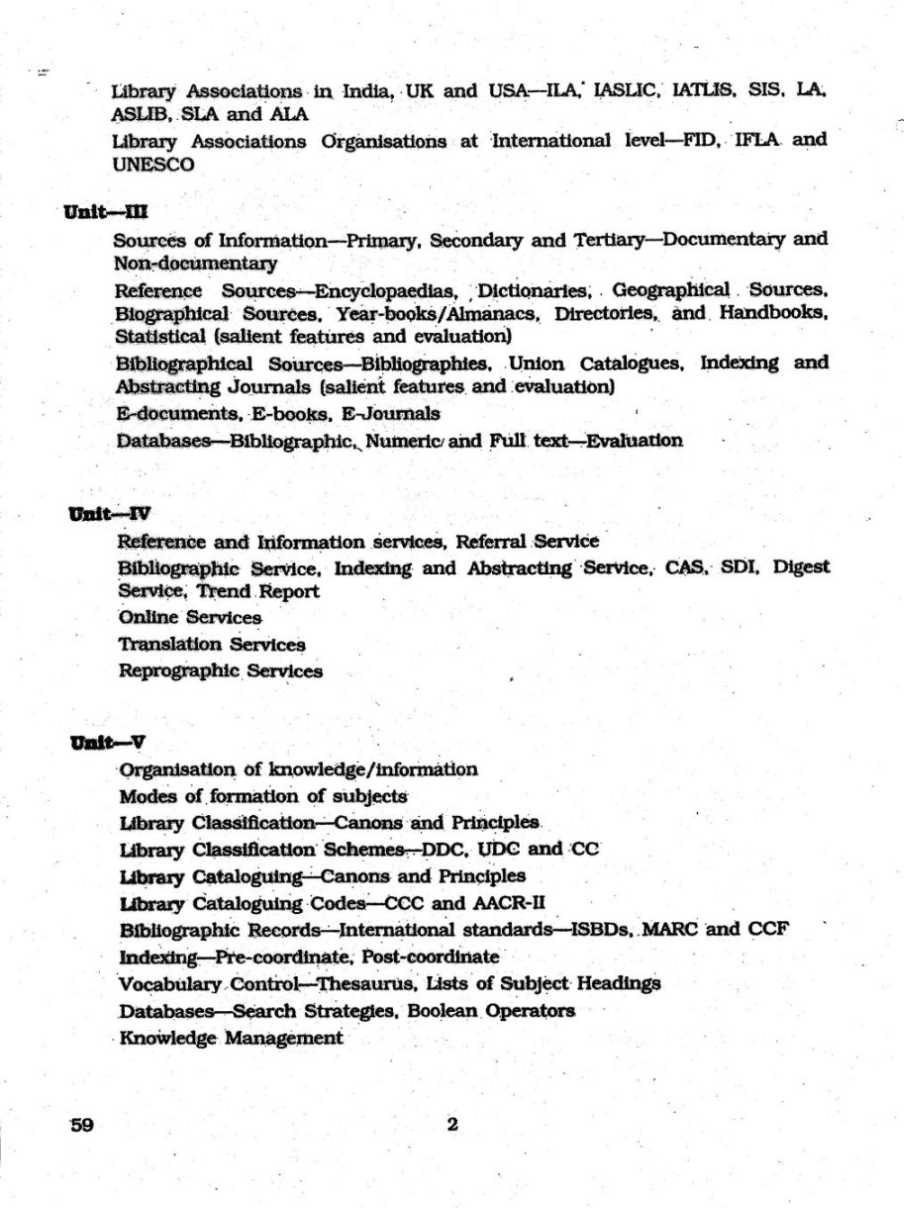 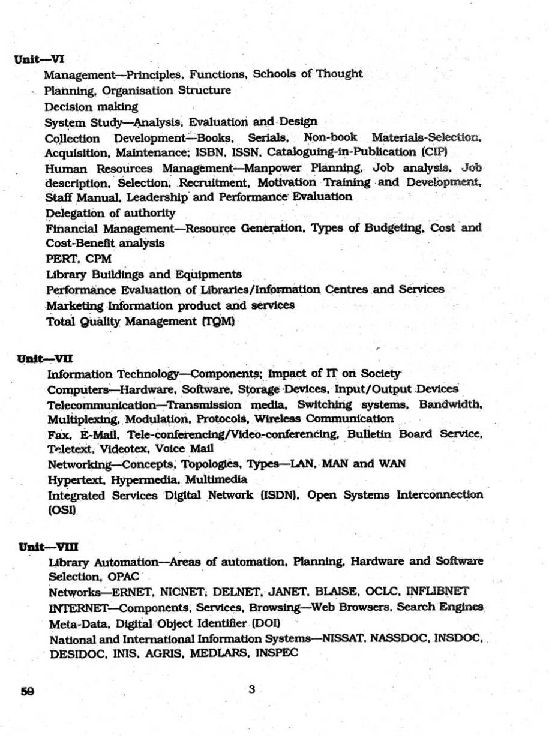 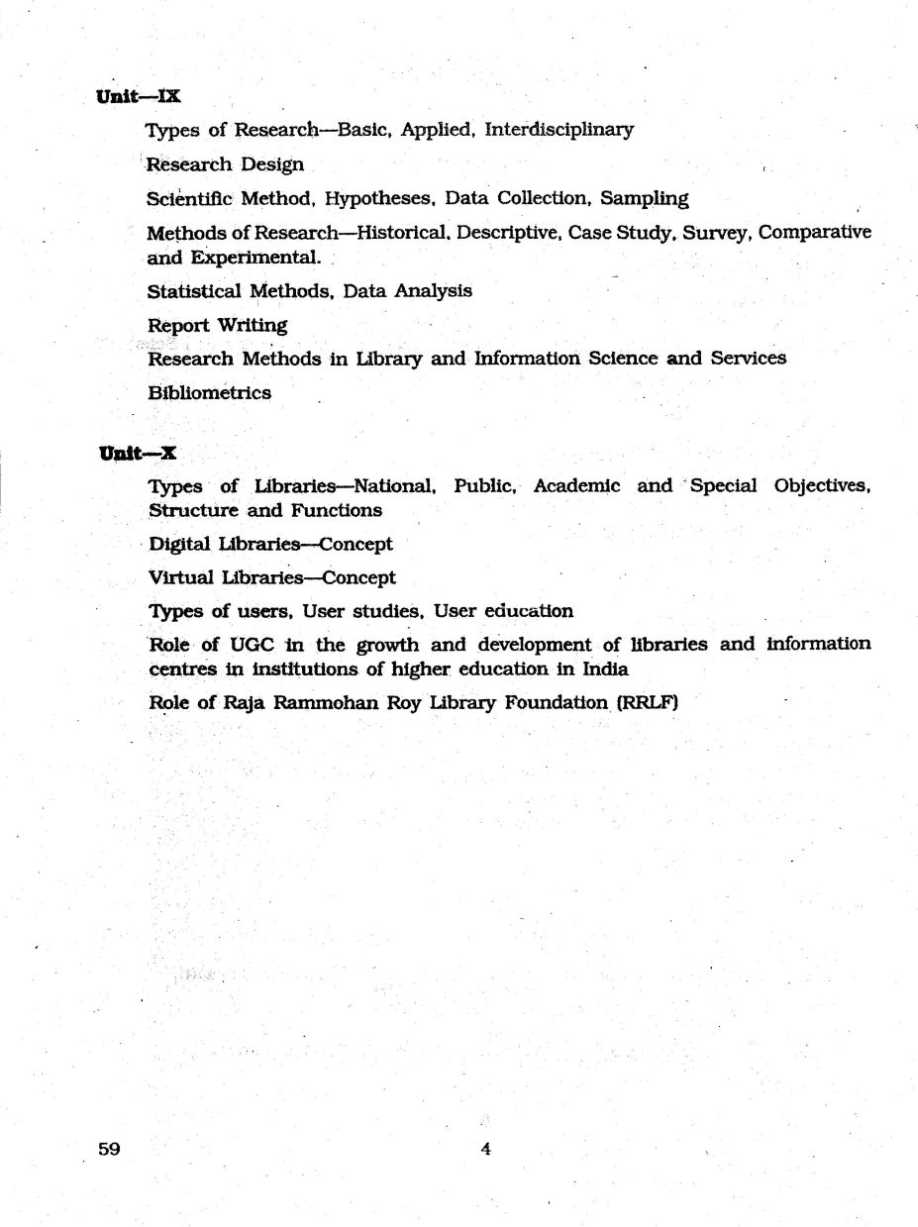 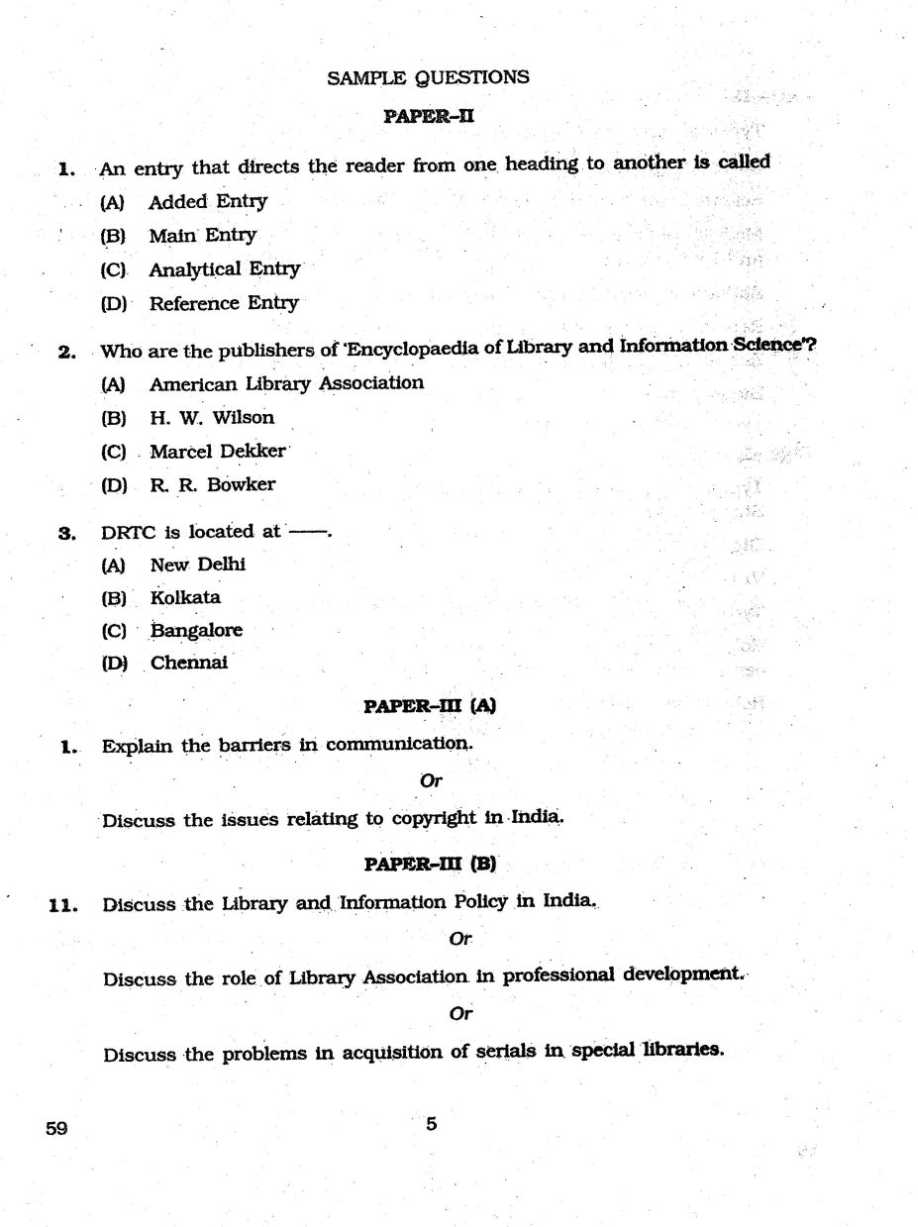 For more detailed information I am uploading a PDF file which is free to download: Contact Details: University Grants Commission New Delhi Bahadur Shah Zafar Marg, Balmiki Basti, Vikram Nagar, New Delhi, Delhi 110002 093 33 778791 India Map Location:
__________________ Answered By StudyChaCha Member |
|
#4
| |||
| |||
|
As you are preparing for the University Grants Commission NET so I am providing the same here. UGC NET Syllabus for Library and Information Science, Code No: 59 Library and Information Science: Library science (often termed library studies or library and information science) is an interdisciplinary or multidisciplinary field that applies the practices, perspectives, and tools of management, information technology, education, and other areas to libraries; the collection, organization, preservation, and dissemination of information resources; and the political economy of information. The first American school for library science was founded by Melvil Dewey at Columbia University in 1887. Historically, library science has also included archival science. This includes how information resources are organized to serve the needs of select user group, how people interact with classification systems and technology, how information is acquired, evaluated and applied by people in and outside of libraries as well as cross-culturally, how people are trained and educated for careers in libraries, the ethics that guide library service and organization, the legal status of libraries and information resources, and the applied science of computer technology used in documentation and records management. Exam Pattern: There will be two question papers - UGC NET Examination in Library and Information Science, Paper II and Paper III. Paper II will have 100 marks in total whereas Paper III will have 150 marks in total. Paper II will cover fifty (50) objective type questions, whereas the Paper III will have seventy five (75) objective type questions, each question carrying two (2) marks. All questions are compulsory in both the papers. The objective type questions will include multiple choices, matching type, true / false and assertion-reasoning type. Paper II & Paper III (Part A & Part B) Syllabus Unit I: Information, Information Science, Information Society, Information as a Resource / Commodity, Information Transfer Cycle (Generation, Collection, Storage, and Dissemination), Role of Information (In Planning, Management, Socio-Economic Development, Technology Transfer), Communication (Channel, Barriers), Intellectual Property Rights (Concept, Copyright, Censorship, Print and Non Print Media), Library and Information Policy at the National Level. Unit II: Laws of Library Science, Library Resource Sharing and Networking, Library Movement, Library Legislation in India, Library Extension Services, Library and Information Science Education in India, Library and Information Profession, Library Association in India, UK and USA, ILA, IASLIC, IATLIS, SIS, LA, ASLIB, SLA, ALA, Library Association Organization at International Level, FID, IFLA, UNESCO. Unit III: Sources of Information (Primary, Secondary and Tertiary. Documentary and Non Documentary), Reference Sources {Encyclopaedias, Dictionaries, Geographical Sources, Biographical sources, Year Books / Almanacs, Directories and Handbooks, Statistical (Salient features and evaluation)}, Bibliographical Sources {Bibliographies, Union Catalogue, Indexing and Abstracting Journals (Salient features and Evaluations)}, E-documents (e-books, e-journals), Databases {Bibliographic, Numeric and Full text (Evaluation)}. Unit IV: Reference and Information Services, Referral Services, Bibliographic Service, Indexing and Abstracting Services, CAS, SDI, Digest Service, Trend Report, Online Services, Translation Services, Reprographic Services. Unit V: Organization of Knowledge / Information, Modes of Formation of Subjects, Library Classification (Cannon and Principles), Library Classification Schemes (DDC, UDC, CC), Library Cataloguing (Cannons and Principles), Library Cataloguing Codes (CCC and AACR 2), Bibliographic Records, Intellectual Standards (ISBD, MARC and CCF), Indexing (Pre and Post co-ordinate), Vocabulary Control (Thesaurus and List of Subject Heading), Databases (Search Strategies and Boolean Operators), Knowledge Management. Unit VI: Management (Principles, Functions and School of Thoughts), Planning, Organization Structure, Decision Making, System Study (Analysis, Evaluation and Design), Collection Development (Books, Serials, non books Material), Selection, Acquisition, Maintenance, ISBN, ISSN, Cataloguing-in-Publication (CIP), Human Resource Management, Manpower Planning, Job Analysis, Job Description, Selection, Recruitment, Motivation, Training and Development, Staff Manual, Leadership and Performance Evaluation, Delegation of Authority, Financial Management, Resource Generation, Types of Budgeting, Cost and Cost Benefit Analysis, PERT, CPM, Library Building and Equipments, Performance Evaluation of Libraries/Information Centers and Services, Marketing Information Product and Services, Total Quality Management (TQM). Unit VII: Information Technology, Components of Information Technology, Impact of IT on Society, Computer Hardware, Computer Software, Storage Devices, Output / Input Devices, Telecommunications, Transmission Medias, Switching Systems, Bandwidth, Multiplexing, Modulation, Protocols, Wireless Communications, Fax, Email, Tele conferencing / video conferencing, Bulleting Board Service, Teletex, Videotex, Voice Mail, Networking (Concept) Networking Topologies, Network Types (LAN, MAN, WAN), Hypertext, Hypermedia, Multimedia, Integrated Service Digital Network (ISDN), Open Systems Interconnections (OSI). Unit VIII: Library Automation, Areas of Library Automation, Planning Library Automation, Hardware and Software Selection for Automation, OPAC, Networks, ERNET, NICNET, DELNET, JANET, BLAISE, OCLC, INFLIBNET, Internet, Components of Internet, Internet Services (Browsing, Web Browsers, Search Engines, Meta Data Digital Object Identifier (DOI), National and International Information Systems, NISSAT, NASSDOC, INSDOC, DESIDOC, INIS, AGRIS, MEDLARS, INSPEC. Unit IX: Types of Research (Basic, Applied, Interdisciplinary), Research Design, Scientific Method, Hypothesis, Data Collection, Sampling, Methods of Research (Historical, Descriptive, Case Study, Survey, Comparative and Experimental), Statistical Methods, Data Analysis, Report Writing, Research Methods in Library and Information Science and Services, Bibliometrics. Unit X: Types of Libraries {National, Public, Academic, and Special (Objectives, structures and functions), Digital Libraries (Concept), Virtual Libraries (Concept), Types of Users, User Studies, User Education, Role of UGC in the Growth and Development of libraries and information centers in institutes of Higher Education in India, Raja Rammohun Roy Library Foundation (RRRLF).
__________________ Answered By StudyChaCha Member Last edited by Vinodt; October 1st, 2015 at 04:46 PM. |